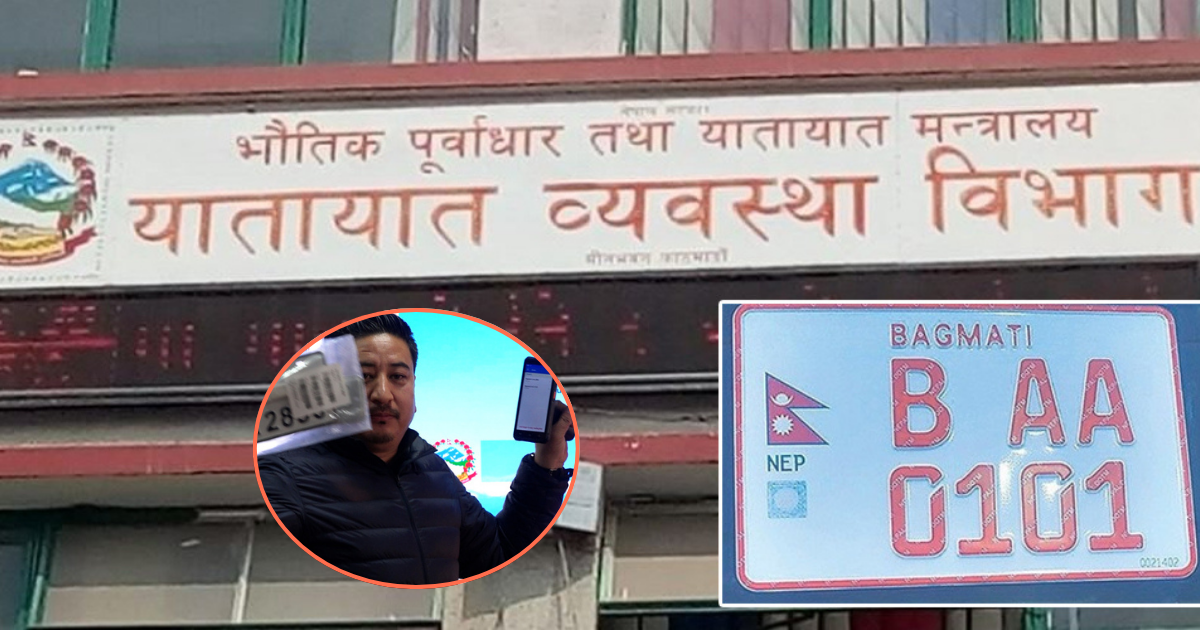Kathmandu: The government has decided to make embossed number plates compulsory for all types of vehicles starting 17 September 2025, the Department of Transport Management announced after a subject committee meeting chaired by Physical Infrastructure and Transport Minister Devendra Dahal.
The committee, attended by provincial ministers and secretaries, ruled that from that date onward, installation of embossed plates will be required at the time of vehicle registration, transfer of ownership and renewal at provincial transport offices. Department of Transport Management will provide technical support, and the Home Ministry will coordinate deployment of traffic police to enforce the new rule.
According to the government, the move aims to reduce vehicle theft, prevent criminal misuse, and register vehicles in a central database. Each embossed plate will contain an RFID chip that can be digitally tracked through an HSENP-enabled system. Officials say the technology will allow authorities to locate vehicles, detect if a vehicle is in distress or stolen, and take swift action based on tracking data.
Rollout ready
Transport Department says it has completed most of the preparations needed to implement the programme. Director Shrikant Yadav told Clickmandu that applicants will not face long delays. Once an application is verified and processed, the embossed plate can be fitted immediately. He said the department has learned from past experiences and pre-printed plates are ready so citizens will not have to wait as they do for vehicle permits.
The government plans to equip all around 2.5 million registered vehicles with embossed plates. Although the scheme was launched in 2016, technical problems previously slowed progress and delayed mass rollout that had been planned for 2022. The department says those technical issues have now been resolved and preparations are being carried out on a fast track. Initially, vehicle owners will be encouraged to comply voluntarily; those who refuse after the incentive phase may face action by traffic police.
Supply, installation progress and costs
Under a contract with Decatur Tiger IT (a US–Bangladesh joint venture), the company must print 2.5 million embossed plates and hand over a functioning plate-production facility to the department. The company is also to supply equipment for tracking and enforcement: construction of 10 RFID-gate locations nationwide and provision of 100 handheld readers for traffic personnel. The department says it will receive these items before 17 September.
So far the department has received 800,000 embossed plates from the contractor. Of these, about 300,000 plates have already been distributed to various offices and about 80,000 have been installed on vehicles; roughly 450,000 plates remain in departmental stock. District offices have been supplied in batches of 5,000–20,000 plates each according to need.
The government has set the following fees for plate fitting:
Two-wheelers: Rs 2,500
Three-wheelers: Rs 2,900
Four-wheelers: Rs 3,200
Vehicles with more than four wheels: Rs 3,600
RFID gates to help track stolen vehicles
Ten RFID gates will be built across the country as part of the embossed-plate package. The department says gates already completed include Nagdhunga and Nagarjun; gates at Farping and Pathalaiya are under construction; additional sites planned are Jagati (Bhaktapur), Itahari, Butwal, Pokhara, Kohalpur and Attariya. If a stolen vehicle passes an RFID gate, the gate will read the plate chip and immediately alert the central database, allowing authorities to trace and recover the vehicle.
Past controversy over contractor selection and financial loss
The embossed-plate project has earlier attracted controversy. When the government awarded the printing contract in 2016 to Decatur Tiger IT — despite a lower bid from the Pinjiao JKG consortium — critics said the decision caused financial loss to the state.
At the time several international and regional firms bid: Decatur Tiger IT quoted US$ 38.75 million, France’s Selp SAS US$ 40.5 million, Bangladesh’s Pharma Computer Service Ltd US$ 42 million, and the Pinjiao JKG consortium US$ 29.681 million. According to the department’s account, awarding the contract to a higher bidder reportedly caused a direct loss to the government of Rs 1,269,465,000.
The Transport Department says the implementation will now proceed only after all technical and logistical groundwork was completed and that 17 September has been announced as the start date to ensure a smooth, well-prepared rollout.



Comment Here